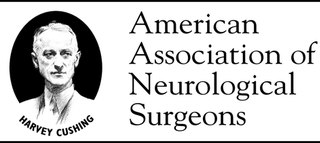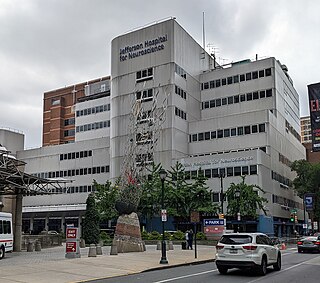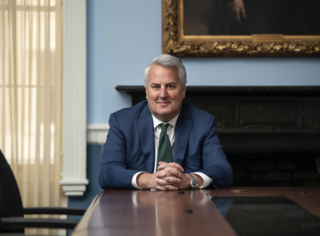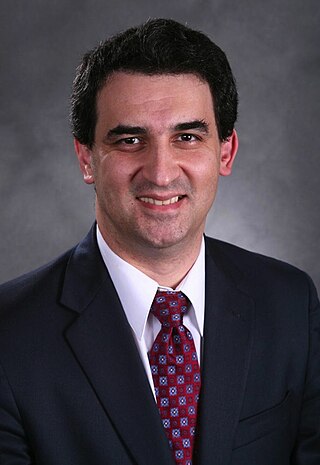
Neurosurgery or neurological surgery, known in common parlance as brain surgery, is the medical specialty concerned with the surgical treatment of disorders which affect any portion of the nervous system including the brain, spinal cord and peripheral nervous system.
Lars Leksell (1907–1986) was a Swedish physician and Professor of Neurosurgery at the Karolinska Institute in Stockholm, Sweden. He was the inventor of radiosurgery.

Radiosurgery is surgery using radiation, that is, the destruction of precisely selected areas of tissue using ionizing radiation rather than excision with a blade. Like other forms of radiation therapy, it is usually used to treat cancer. Radiosurgery was originally defined by the Swedish neurosurgeon Lars Leksell as "a single high dose fraction of radiation, stereotactically directed to an intracranial region of interest".

Stereotactic surgery is a minimally invasive form of surgical intervention that makes use of a three-dimensional coordinate system to locate small targets inside the body and to perform on them some action such as ablation, biopsy, lesion, injection, stimulation, implantation, radiosurgery (SRS), etc.
Elekta is a global Swedish company that develops and produces radiation therapy and radiosurgery-related equipment and clinical management for the treatment of cancer and brain disorders. Elekta has a global presence in more than 120 countries, with over 40 offices around the world and about 4,700 employees.
The CyberKnife system is a radiation therapy device manufactured by Accuray. The system is used to deliver radiosurgery for the treatment of benign tumors, malignant tumors and other medical conditions.

The American Association of Neurological Surgeons (AANS) is a scientific and educational association focused on advancing the specialty of neurological surgery. The organization has over 8,000 members around the world. It is one of the five Continental Associations of the World Federation of Neurosurgical Societies (WFNS), the other four being the AASNS, CAANS, EANS and FLANC.
Allan J. Hamilton is an American physician and medical consultant to ABC's medical drama Grey's Anatomy based in Tucson, Arizona. A professor of Neurosurgery at the University of Arizona College of Medicine – Tucson, Dr. Hamilton was elected a Fellow of the American College of Surgeons in 1994. In 1995, Dr. Hamilton was promoted to Chief of Neurosurgery and became Chairman of the Department of Surgery in 1998. He currently holds a tenured professorship in Neurosurgery, as well as additional professorships in the Departments of Psychology, Radiation Oncology, and the School of Electrical and Computer Engineering. His book The Scalpel and the Soul: Encounters with Surgery, the Supernatural, and the Healing Power of Hope was released in March 2008. It has been translated into several languages. He is currently at work on a second book on spirituality and horsemanship, specifically on the sexual impulses of mature mares.
Griffith Rutherford Harsh IV is an American neurosurgeon, Professor of Neurological Surgery at the University of California, Davis, and former Julian R. Youmans Endowed Chair of the Department1. Dr. Harsh also led the UC Davis School of Medicine, UC Davis Health, faculty as Chair of the Council of Department Chairs. Currently, he maintains his academic appointment at UC Davis and holds Visiting Professorships at the University of Nairobi and Kenyatta University2, while living in Nairobi with his wife, Meg Whitman, the US Ambassador to Kenya3.
Howard Landy is a professor of neurosurgery in the Department of Neurological Surgery and Radiation Oncology at the University of Miami and serves as the director of quality and patient safety at Jackson Memorial Hospital.

Michael L. J. Apuzzo is an American academic neurological surgeon, the Edwin M. Todd/Trent H. Wells, Jr. Professor Emeritus of Neurological Surgery and Radiation Oncology, Biology, and Physics at the Keck School of Medicine, of the University of Southern California. He is also editor emeritus of the peer-reviewed journals World Neurosurgery and Neurosurgery. He is distinguished adjunct professor of neurosurgery at the Yale School of Medicine, distinguished professor of advanced neurosurgery and neuroscience and senior advisor, at the Neurological Institute, Wexner Medical School, The Ohio State University, and adjunct professor of neurosurgery, Weill Cornell Medicine, Department of Neurological Surgery & Weill Cornell Brain and Spine Center.
James R. Doty, M.D., FACS, FICS, FAANS is a clinical professor of neurosurgery at Stanford University and founder and director of the Center for Compassion and Altruism Research and Education, an affiliate of the Stanford Neurosciences Institute. He is the author of a self-help book called Into the Magic Shop: A Neurosurgeon's Quest to Discover the Mysteries of the Brain and the Secrets of the Heart. Doty is also the Senior Editor of the Oxford Handbook of Compassion Science (2017).

The N-localizer is a device that enables guidance of stereotactic surgery or radiosurgery using tomographic images that are obtained via computed tomography (CT), magnetic resonance imaging (MRI), or positron emission tomography (PET). The N-localizer comprises a diagonal rod that spans two vertical rods to form an N-shape and permits calculation of the point where a tomographic image plane intersects the diagonal rod. Attaching three N-localizers to a stereotactic instrument allows calculation of three points where a tomographic image plane intersects three diagonal rods. These points determine the spatial orientation of the tomographic image plane relative to the stereotactic frame.

Jefferson Hospital for Neuroscience is a hospital in Center City Philadelphia, affiliated with Thomas Jefferson University and Thomas Jefferson University Hospital in Philadelphia. The hospital focuses on treating brain-related diseases and disorders. It is the only hospital of its kind in the Philadelphia area.
Robert Wheeler Rand, was an American neurosurgeon, inventor, and Professor of Neurosurgery in the Department of Neurosurgery at the University of California Los Angeles (UCLA) from 1953 to 1989.
L. Dade Lunsford is an American neurosurgeon, focusing in brain tumor management, Gamma Knife® stereotactic radiosurgery, movement disorders and trigeminal neuralgia and vascular malformations, currently the Lars Leksell Distinguished Professor at University of Pittsburgh. He is the 2017 recipient of the Herbert Olivecrona Award.

Jay Steven Loeffler was an American physician at Massachusetts General Hospital where he served as Chair of the Department of Radiation Oncology since 2000. He was the Herman and Joan Suit Professor of Radiation Oncology and Professor of Neurosurgery at Harvard Medical School.

Konstantin Slavin is a Professor and Head of the Department of Stereotactic and functional neurosurgery at the University of Illinois College of Medicine. He is a former president of the American Society for Stereotactic and functional neurosurgery and current vice-president of the World Society for Stereotactic and Functional Neurosurgery. His specialties include Aneurysm, Brain surgery, Brain Tumor, Cerebrovascular Disorders, Craniotomy, Dystonia, Essential Tremor, Facial Nerve Pain, Facial Pain, Glioblastoma, Headache disorders, Laminectomy, Lower back pain, Movement Disorders, Multiple Sclerosis, Neck Pain, Neurosurgery, Neurosurgical Procedures, Pain, Parkinson Disease, Spinal Cord Injuries, and Stroke.

Deepak Agrawal born 10 November 1970, is a professor neurosurgery at All India Institute of Medical Sciences, New Delhi is one of the top 10 surgeons in the neurosurgery. During his stint as chairman computarization, he reformed the ICT processes at AIIMS, New Delhi and also helped patients in All India Institute of Medical Sciences, New Delhi to get a Unique Health Identification (UHID), which documents their journey in the hospital. He also pioneered stem cell research in spinal cord injury in India. Agrawal has pioneered DREZotomy technique for neuropathic pain in India and has refined the procedure to make it safer and more accessible to patients.
Accuray is a radiation therapy company that develops, manufactures, and sells radiation therapy systems to deliver treatments including stereotactic radiosurgery (SRS) and stereotactic body radiation therapy (SBRT). It is the developer of innovative technologies, the CyberKnife and TomoTherapy platforms, including the Radixact System, the latest generation TomoTherapy platform. The company is headquartered in Sunnyvale, CA, the United States. The platforms are installed in leading healthcare centres in approximately 50 countries globally.









